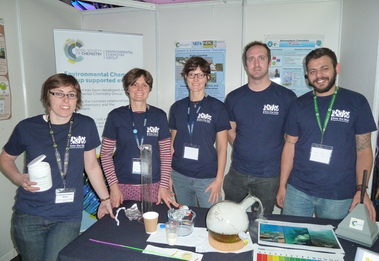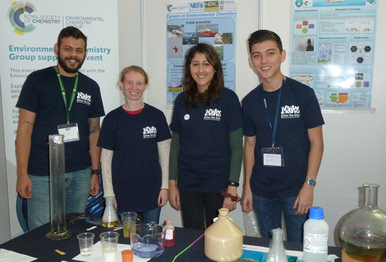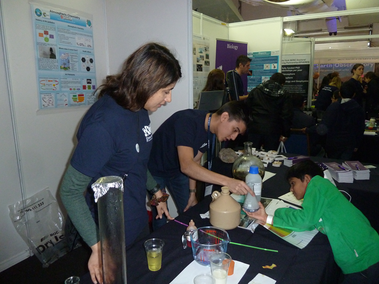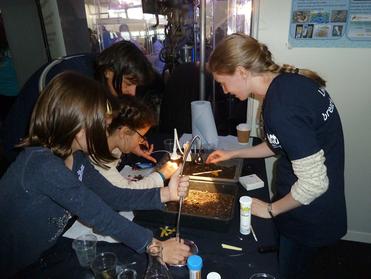Environmental chemistry team at the NERC “Into the blue” public event
Meeting report by Eloise de Spretter, Syngenta & Callum Taylor (University of Huddersfield) and Zoë Fleming (University of Leicester)
[email protected]
ECG Bulletin February 2017
[email protected]
ECG Bulletin February 2017
A team of ten young scientists helped out at the NERC “Into the blue” environmental science showcase event in Manchester during half-term in October 2016. These are our experiences of the five days of demonstrations and talking to the public, and our motivations for sharing our enthusiasm for the subject with parents and children.
The Natural Environment Research Council (NERC) organised a large outreach event this year. This followed the success of allowing visitors on board the NERC’s Discovery research vessel last year, whilst it was anchored in the Thames in London. This year, members of the public were allowed to inspect the NERC’s dedicated aeroplane for atmospheric and oceanic research at Manchester airport. In an adjacent hangar, a host of environmental science outreach activities and stalls were on display. The whole event attracted much media interest (BBC Newsround, Sky News and BBC evening and regional news programmes). Just over five thousand members of the public visited over five days, and two hundred stakeholders and VIPs attended the evening events.
The Natural Environment Research Council (NERC) organised a large outreach event this year. This followed the success of allowing visitors on board the NERC’s Discovery research vessel last year, whilst it was anchored in the Thames in London. This year, members of the public were allowed to inspect the NERC’s dedicated aeroplane for atmospheric and oceanic research at Manchester airport. In an adjacent hangar, a host of environmental science outreach activities and stalls were on display. The whole event attracted much media interest (BBC Newsround, Sky News and BBC evening and regional news programmes). Just over five thousand members of the public visited over five days, and two hundred stakeholders and VIPs attended the evening events.
|
Each of the five NERC research centres had been encouraged to come up with an idea for a stall for the exhibition. Our team decided on a general environmental chemistry theme, which included some of the successful activities we had used for previous RSC-sponsored outreach activities:
The volunteers were recruited through ECG social media plus friends and colleagues, and ranged from teachers, science communicators, environmental consultants, an undergraduate, a PhD student, an early career RSC committee member, and post-doctoral researchers. The RSC NW region education officer, Charlotte Still, also joined in. We all shared a flat locally, so enjoyed the rare downtime we had at the end of the long days. We will keep in touch for future outreach opportunities as the team worked well together, and each individual brought their own perspective to the demonstrations. Volunteers’ impressions Callum Taylor I am currently on my placement year of my degree in Forensic and Analytical Science at the University of Huddersfield. I have been a member of the RSC for over a year now, and I jumped at this opportunity to volunteer for a few days. |
|
|
In some areas of science, keeping the public involved and updated with developments in specialised research is perhaps not too important. However, in the environmental sciences, it is crucial because everyone, from a child in primary school to the CEO of a FTSE 100 company, contributes to the environmental challenges faced by society. Outreach events such as “Into the blue” stimulate interest and awareness among the public and even among other scientists about this topic. This event opened my eyes to the scale of environmental research in the UK, particularly the monitoring programmes in oceanic and atmospheric research. I also found the British Antarctic Survey stall very stimulating.
Volunteering for the ECG at this event has shown me the variety of career paths available to the younger scientist. For example, monitoring pollution or finding innovative solutions to handling disposal. I learnt that communicating your scientific discoveries to the public can be difficult due to varying levels of education and interest. To engage younger generations with science and the environment with demonstrations and fun hands on experiments, such as our dry ice experiment, will surely spark interest for some of them to continue with science later in life. In terms of my own career, this event has shown me that there are many paths available, and so being bound to a rigid plan for the future is not necessarily more beneficial than a flexible one. To adapt John Donne, it is no one person’s duty to look after the earth, it is all of ours. Eloise de Spretter I graduated in July with integrated Masters Degree in Environmental Science, and am now working in the agriculture sector as a scientific data administrator. |
|
I too jumped at this chance to help with the Environmental Chemistry Group’s stand at the “Into the blue” event. It was an exciting opportunity to talk to the public about something I care about, and to meet those conducting research in the environmental sciences. Communicating science to the public is extremely important and also challenging. This is particularly true of environmental science, which incorporates so many different concepts. “Into the blue” succeeded in communicating these ideas to the public, through fun, games and hands-on exhibits. At the ECG stand, I found children were excited to dig in the soil to see what they could find and were asking, “How did plastic get there?” Parents asked what they personally could do to help make a difference and reduce the amount of plastics that end up in our oceans. Many people commented that the event had opened their eyes to a whole world of environmental challenges that they had not considered before.
It wasn’t just visitors who had the chance to see the research presented at this event; I had an amazing time meeting and speaking to the other exhibitors. I particularly enjoyed the tour of the NERC research aeroplane and visiting the British Antarctic Survey stall, where you could see the amount of preparation, work, time and effort that takes place before an expedition. Sometimes studying the environment can feel all doom and gloom. However, this event has inspired me and I believe it inspired many of the visitors too.
Further information
NERC research aircraft in Manchester in the News: http://www.bbc.co.uk/news/video_and_audio/headlines/37770945
NERC’s “Into the blue” website: http://intotheblue.nerc.ac.uk/manchester/
It wasn’t just visitors who had the chance to see the research presented at this event; I had an amazing time meeting and speaking to the other exhibitors. I particularly enjoyed the tour of the NERC research aeroplane and visiting the British Antarctic Survey stall, where you could see the amount of preparation, work, time and effort that takes place before an expedition. Sometimes studying the environment can feel all doom and gloom. However, this event has inspired me and I believe it inspired many of the visitors too.
Further information
NERC research aircraft in Manchester in the News: http://www.bbc.co.uk/news/video_and_audio/headlines/37770945
NERC’s “Into the blue” website: http://intotheblue.nerc.ac.uk/manchester/





